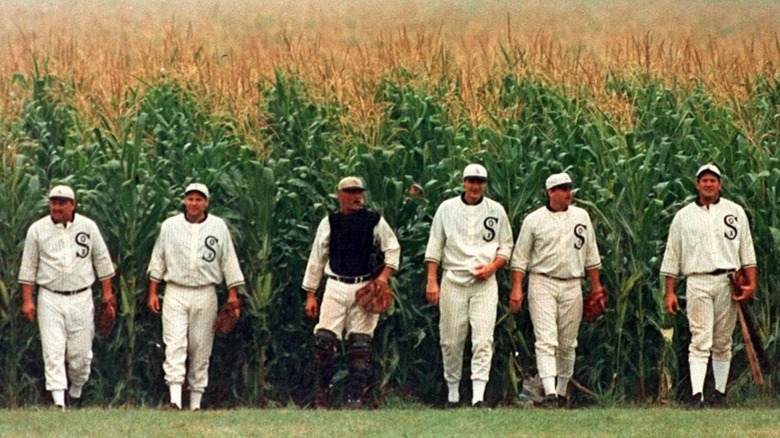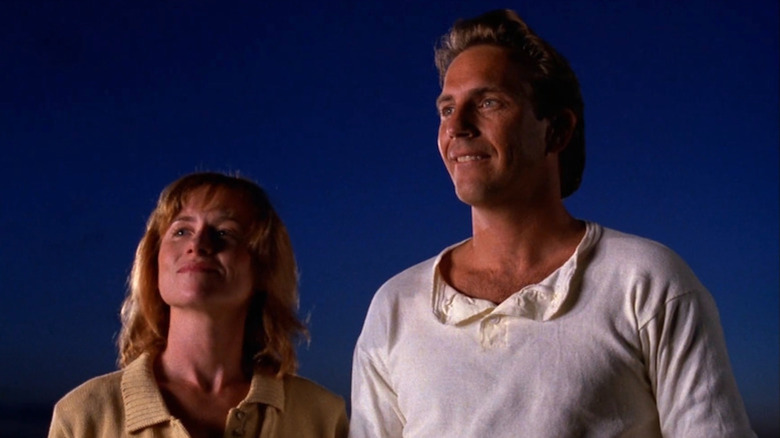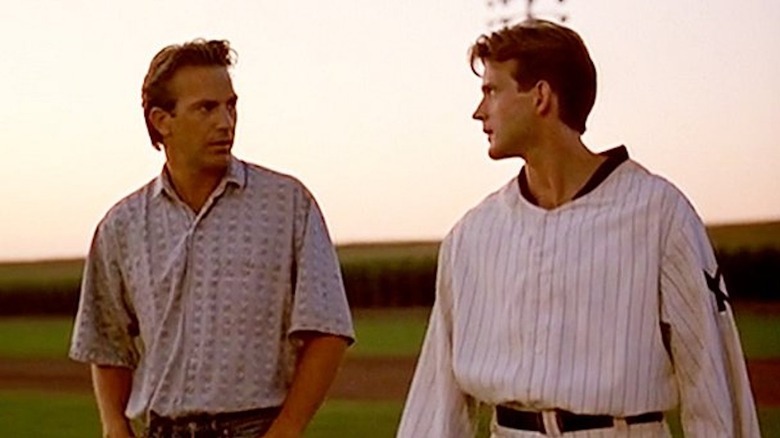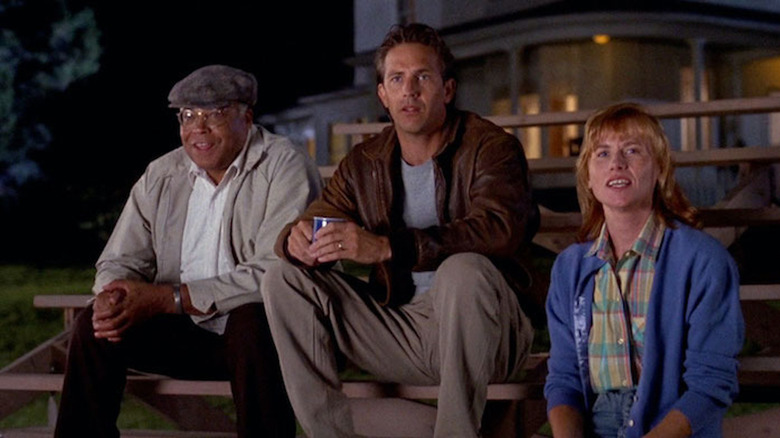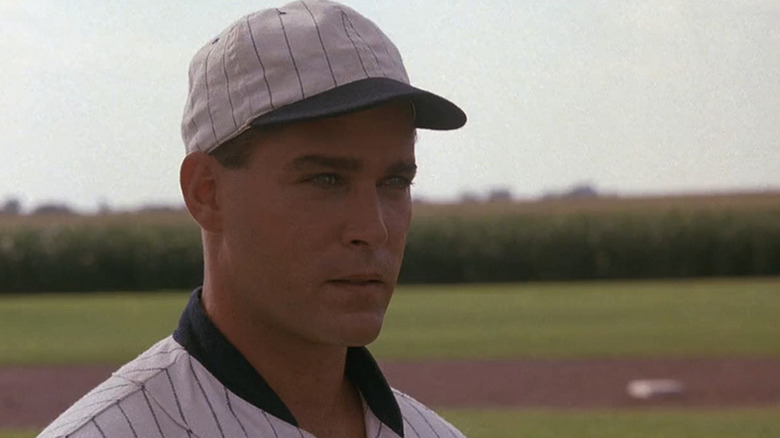Field Of Dreams Ending Explained: A Leap Of Faith
Phil Alden Robinson's "Field of Dreams" was the sleeper hit of spring 1989. Based on W.P. Kinsella's wistful novel "Shoeless Joe," the film connected with audiences of all ages, but Baby Boomers in particular. Kevin Costner's Ray Kinsella, like many former hippies, became estranged from his parents during the late 1960s. All Ray had was his dad, and all they had in common was baseball, but even that became a contentious issue. A young and fiery Ray finally hit his breaking point, said something awful to his dad, and never saw him again.
That awful utterance and subsequent shunning gets rectified in the waning moments of "Field of Dreams," and if you saw the film during its initial theatrical release, you beheld the heartening spectacle of mainstream moviegoers, especially men, hanging out through the credits longer than usual. Robinson had crafted the most pulverizing male weepie since Buzz Kulik's "Brian's Song," and guys who'd been taught their whole lives to never let anyone see them cry (let alone cry at all) needed a moment.
Few films stick their landing as hard as "Field of Dreams." Upon learning that The Voice's "If you build it, he will come" referred not to the cornfield return of Shoeless Joe Jackson, but Ray's father, you've got to be made of granite to remain emotionally composed. Robinson performs a deft sleight of hand throughout his whimsical masterpiece, foregrounding the threat of Ray losing his farm and keeping his deep-seated sorrow on the periphery. We're too busy trying to solve the mystery along with Ray to consider that every single one of his actions is leading him to the unlikeliest of reconciliations.
And while the film appears to be a surface-level fantasy, there's a lot more going on under the hood than many viewers realize. Indeed, there are several critics who believe "Field of Dreams" is a generational betrayal. Let's get into it.
What you need to remember about the plot of Field of Dreams
"Field of Dreams" is an ingenious Frank Capra-esque fantasy built around America's national pastime and the movie star who's most closely associated with everything we love about the sport. The film opens with Ray telling us how he was raised by his father after his mother died, met his wife Annie (Amy Madigan), shunned his father and, despite having zero expertise in the field, bought a farm. The montage ends with Ray telling us "But until I heard The Voice, I'd never done a crazy thing in my life."
That "crazy thing" is interpreting The Voice's vague entreaty as a call to build a baseball field in the middle of his cornfield as a means of assuaging the tortured soul of Shoeless Joe Jackson, who was banned for life from the game he loved for participating in the 1919 Black Sox Scandal (eight members of the Chicago White Sox took money from Arnold Rothstein's gambling syndicate and, despite being heavy favorites, threw that year's World Series). Jackson, then one of the best players of the game (and considered by some to be one of the greatest of all time), took the money, but his superb stats suggest he played to win.
Annie backs Ray's quixotic undertaking, and Jackson (Ray Liotta) finally shows up. So, eventually, do the other disgraced members of that White Sox team. It's a miracle, but now what? The Voice commands Ray to track down reclusive counterculture author Terence Mann (James Earl Jones), who, in his youth, mourned the loss of the Brooklyn Dodgers. Ray's next mission is to bring Archibald "Moonlight" Graham (Burt Lancaster), a very real person who played in one Major League Baseball game and never got to bat. The old Graham, now a family doctor, resists the offer, but, inexplicably, Ray and Terence pick up his boyish incarnation (Frank Whaley) on the way back to Iowa. Everything is perfect. But what's in it for Ray?
What happened at the end of Field of Dreams
Ray's banker brother-in-law, Mark, (Timothy Busfield) has been pressuring Ray to sell the farm, which has become a money pit thanks to the field. He shows up to the field upon Ray's return from his road trip to make a final offer. He is also baffled by Ray's commitment to the field because he can't see the ballplayers. This bewilderment turns to rage when Ray rejects his generous offer that will get his sister's family out of a financially ruinous situation, which leads to an accident involving Ray's daughter (Gaby Hoffmann). She's about to choke to death on a hot dog until Graham (who's just hit a sacrifice fly), crosses the foul line, turns into his elder self, and saves her life.
Oh, and amid all of this, Terence gives the most moving speech about the enduring power of baseball ever written.
After Graham's intercession, Mark can now see the players and implores Ray to keep the farm. Jackson decides the players have endured enough excitement for the day, but before walking back to the cornfield, he invites Terence to join them. This incenses Ray, who feels he's received no personal reward for risking his family's future. That's when Jackson introduces Ray to his father as a young man. The field was, as Terence observed earlier, Ray's penance. As James Horner's score swells, Ray gets to introduce his father to Annie and his granddaughter, and the two men get to have a soul-salving catch.
What the end of Field of Dreams means
Ray's mission is admirably selfless until the end. His dad instilled the gospel of Jackson in him, but building the field isn't about honoring his father; it's about doing right by a phenomenal baseball player who arguably got a raw deal from Major League Baseball. If you've seen John Sayles' excellent "Eight Men Out," you know that the White Sox players' intentionally lost the World Series out of contempt for owner Charles Comiskey's miserly ways. It was about the money.
When Ray and Jackson first meet, the latter waxes poetic on the pure joy of the game before concluding that he would've played "for nothing." This dovetails with Ray's actions; he's not doing this for profit, he's doing it because The Voice's invocations keep paying off in miracles great and small.
Ultimately, Ray discovers that he is making amends to his father, which is why dudes have a good cry everytime they watch "Field of Dreams." But did Ray do anything wrong? We know that he was at loggerheads politically with his dad, but if the latter was a Vietnam War-supporting Nixonite, Ray's antipathy was fairly well earned. Now that we're living in a time when brainwormed Americans are rabidly supporting authoritarian politicians, Ray's regret feels somewhat misplaced.
Peter Travers panned "Field of Dreams" for being Reagan Democrat hokum, an apologia for the protest era, but Ray isn't doing this for the man he shut out; he's yearning for the man he never knew. When he sees the fresh-faced incarnation of his father (Dwier Brown), he's awestruck. "He's got his whole life ahead of him, and I'm not even a glint in his eye." Ray risked everything to build this field, and he's been gifted the best version of the man who raised him.
There is an icky capitalistic element at play via Terence's suggestion that Ray should charge visitors twenty bucks to watch the purest form of (pre-desegregation era) baseball, but you figure the other greats will find their way to the field. On the whole, Robinson cuts through the political and appeals to our better angels, and how wonderful it felt to sit in the stands of a ballpark with your dad before this unremittingly cruel world wrecked everything.
What has the cast and crew of Field of Dreams said about the ending
The general public might've been knocked sideways by the ending of "Field of Dreams," but the key players knew they had the goods. As Costner said in an interview with Front Row Features:
"I remember distinctly reading it on my couch and thinking I really want to do this movie. I remember thinking, what a beautiful [film]. I felt like I had a giant secret. I knew a year from then everyone else would know the secret."
Speaking with '80s Movie Guide, Robinson saw Ray's reunion with his dad as the culmination of a mad journey fired by the character's desire to be his own man. Per Robinson:
"Here's a guy who obviously felt for a while he had to grow up. He has a wife and a child and the responsibility of a farm. And now, here's this opportunity: this voice and this vision come to him, and he thinks, this may be my last chance to see if I can still be that person. And he uses it as an example to be the opposite of his father who never did a spontaneous thing in his life or an illogical thing."
This is why "Field of Dreams" continues to resonate. It's about a character desperate to avoid the workaday rut that beats down decent human beings and turns them into malcontents. You've got to take a leap of faith here and there. The fewer what-ifs you're asking in your later years, the better. And if you've the opportunity to have long-dead baseball players knocking the ball around in your background, maybe seize it.
